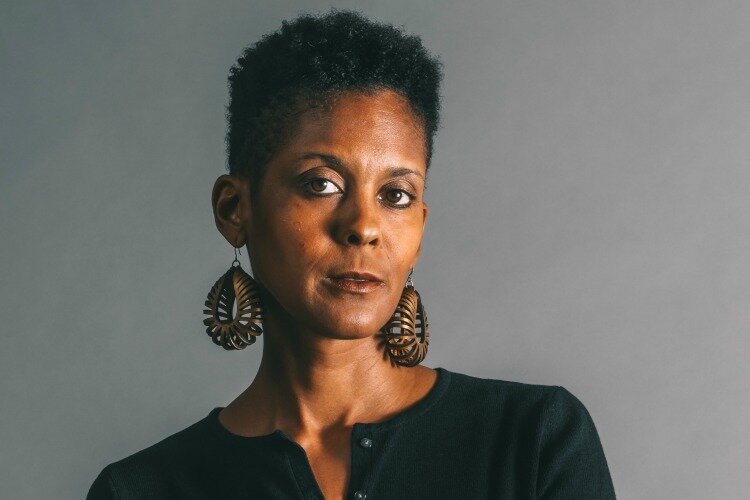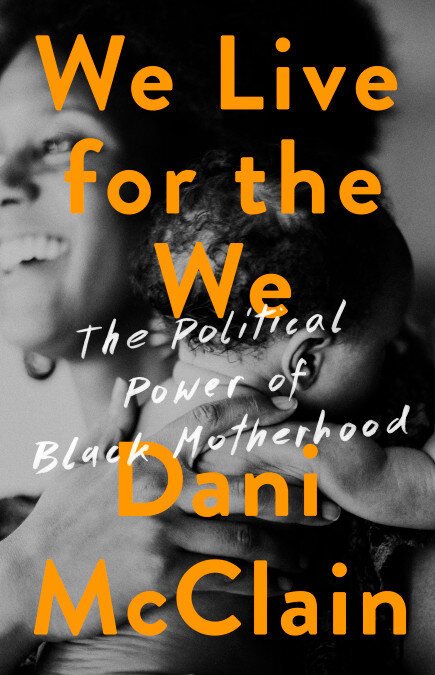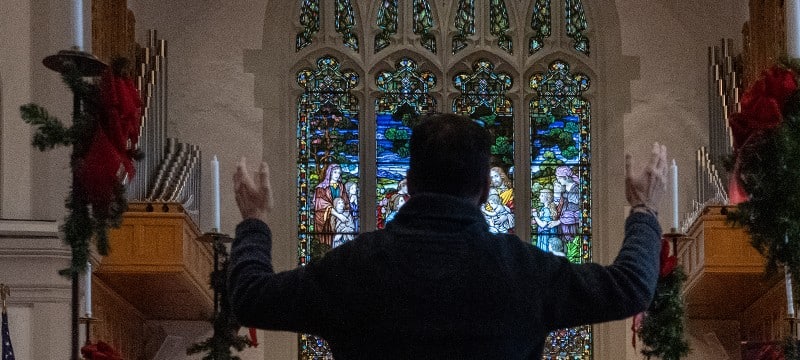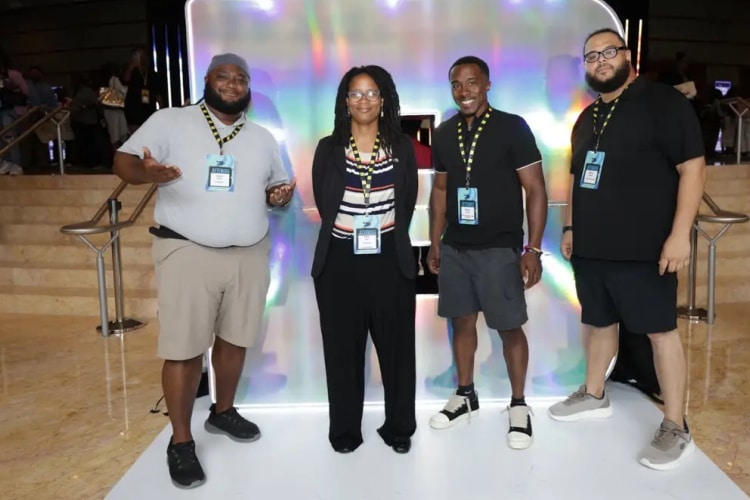Meet Dani McClain, the library’s 2020 Writer-in-Residence
The award-winning journalist and author hopes to reconnect with her hometown during her tenure.

Cincinnati’s public library system has been a part of Dani McClain’s life since she was a child.
“I remember my mom taking me to the Main branch when I was little, [and] the Madeira branch is the one closest to where I grew up, so I have a ton of memories of being there,” she says, “and at the Blue Ash branch, working on homework, working on projects.”
As an adult, she’s taken her daughter to story times in Clifton and used the library to research her book.
“I just have a very positive association with the library,” she says, “and I think because of the experience — the kind of foundational experience I have with the library as a child — connections to libraries have been important to me wherever I’ve lived.”
As the library’s 2020 Writer-in-Residence, McClain — an award-winning journalist and author — will blog, participate in podcasts, and host office hours and workshops at branch locations throughout the city.
McClain has honed her writing and communications skills for a variety of publications all over the country, including New York City, Wisconsin, Florida, and California.
But her roots are in Cincinnati. Generations of McClain’s family lived in Camp Dennison, she grew up in the house built by her grandfather’s grandparents, and her mom’s oldest sister was part of the first graduating class at Indian Hill High School.
McClain is also an Indian Hill alumnae, and wrote for and edited at the school newspaper, the Chieftain. She also studied Latin and was involved in the Junior Classical League, a state and national organization for high school students interested in the classics, and served as the editor for their statewide and national publication.
At Columbia University, where she studied history as an undergrad, she also edited a literary magazine and wrote theater reviews for another campus publication.
Her first job after college when she was living in Brooklyn was as Farai Chideya’s assistant editor for her web venture, Pop + Politics, followed by a stint at what is now called the Drug Policy Alliance in New York City. While there, she worked on ending the war on drugs — the war on people of color and poor people, reframing drug abuse as a public health issue as opposed to a criminal justice issue, the decriminalization of marijuana, and providing safe injection rooms.
Returning home in the wake of tragedy
The events of 2001 left McClain — and the nation — uneasy.
First, the riots that took place in Over-the-Rhine after 19-year-old Timothy Thomas was shot by Officer Stephen Roach as he was being pursued for nonviolent offenses. Thomas, who was unarmed, died on April 7 and the resulting civil unrest lasted four days and forced police reform in Cincinnati.
“I remember watching CNN that April day that the uprising started getting national coverage,” McClain says. “I was at work — I was at my job in the communications office at Drug Policy Alliance and I remember watching and thinking, ‘This is interesting that here I am in New York working on issues of racial injustice when in my own hometown things are flaring and I’m not there.’”
“What happened in Cincinnati was the first so-called race riot of the 21st century,” she continues, “so it just really struck me that here are these issues that I care about and here I am in New York City working on these things where there’s obviously a lot happening in my hometown that … I don’t know enough about.”
She acknowledges that Indian Hill, her school district, is not locally known for diversity, but argues that, at the time of her attendance, African-American and working-class white families from Camp Dennison and Kenwood contributed to its diversity.
“I felt very much a part of the Indian Hill school community when I went there,” she says. “I will say what was hardest was not having any teachers or administrators who were not white; I only had white teachers and administrators from kindergarten through the 12th grade.”
But, she continues, she had strong family ties and neighborhood connections.
“I’m very thankful for the fact that I had a home community that was largely black — and also, I don’t want to overlook this because this gets overlooked a lot — working-class and poor white people were also in Camp Dennison. When I was growing up, [Indian Hill] was a little bit more complex and had a little bit more racial and class diversity than I think people assume,” she says.
Still, the killing of an unarmed African-American teenager at the hands of a white cop got her thinking of home and the work she could do here.
“I’ve never been one of those people that’s like, ‘I hate Cincinnati, once I’m out of here I’m never coming back,’” McClain says. “That’s never been my approach. I’ve lived in places that are more interesting to me culturally and socially but my family is here and it never occurred to me to cut off ties with this place.”
Then, on September 11, 2001, during the terrorist attack on the World Trade Center, she was in South Africa for the United Nations World Conference Against Racism, visiting Robben Island where Nelson Mandela was imprisoned.
She considers both incidents turning points.
“I think there’s something about the kind of anxiety that gripped New York after September 11th that made it feel like it was time for me to leave,” she says.
McClain moved to Clifton in the fall of 2002 and worked at Kilimanjaro on Ludlow while also teaching social studies at Clark Montessori and freelancing for CityBeat. During that time, she applied to journalism school at Columbia and returned for her master’s in 2005.
“I knew I wanted to work in print journalism,” she says, “and I graduated Columbia’s Journalism School in May of 2006, so this was really before the bottom fell out of the newspaper industry — it was right before that — so the conventional wisdom at that time was if you wanted to write and eventually make your way to magazines, you got a job at a major metropolitan paper.”
She started out interning at the Milwaukee Journal Sentinel and the Miami Herald before she was hired back at the Journal Sentinel, covering education and learning about beat reporting for the next two years.
Following that, she moved to Oakland, California in 2008 where she spent four years at a nonprofit civil rights organization called Color of Change running — and training people to run — issue-based campaigns for racial justice.
“I had a great time living in Oakland,” she says. “I really loved the Bay Area.”
She left her job to become an independent journalist after receiving a fellowship from Type Media Center (formerly the Nation Institute). In 2015, she moved back to Cincinnati following a death in her family.
The fellowship was for covering reproductive rights, which, eventually, led to her first book.

She’s still freelancing full time and We Live for the We: The Political Power of Black Motherhood — which is a mix of reporting and memoir — was published in April of 2019.
“I’ve been interested in a project of this sort for many, many years,” McClain says, “certainly going back to journalism school. I took a class in 2006 where I started writing about some of the themes and subject matter that I touch on in the book.”
“I was just kind of curious as to how people cover reproductive rights, and so I noticed that what most people do is cover the politics of abortion and contraception,” she continues. “But I started talking to people who were primarily black or people of color who were broadening the frame beyond just abortion and contraception to talk about parenting as well.”
“So,” she continues, “they introduced me to the reproductive justice frame, which is a human rights framework that advances the right to have a child, to not have a child, and to parent the children that we do have in safe and healthy communities.”
She started an article while she was pregnant in 2016 about maternal health after hearing the statistic that black women are three to four times more likely than white women to die of pregnancy- and childbirth-related complications. That story — “What It’s Like to Be Black and Pregnant When You Know How Dangerous that Can Be” — ended up on the cover of The Nation the following February and, ultimately, became the foundation for the first chapter of her book.
“I had a lot of questions as I was preparing for the birth of my child,” she says. “Some of those questions, I could turn to family members and see how they had approached having children and raising children, but I also had a lot of questions about what it means to raise a girl child — a black child — in the era of #BlackLivesMatter and #MeToo, and I happen to have been reporting on related issues covering reproductive justice organizing, covering racial justice organizing for the past seven years, and I thought it would make sense to turn to some of my sources who are parents and see how they bring their values from the political realm into the family realm.”
“That’s what the book is,” she continues. “It’s basically a series of conversations with primarily black mothers and grandmothers about how they’ve approached raising their children.”
The book focuses on all stages of raising kids — from infancy to adulthood, which has helped McClain navigate the challenges of raising her 3-year-old in their Northside home.
“In general, it helped me feel more prepared,” she says. “I do feel like I have a broader sense of how different people approach challenges in parenting.”
She’s been touring all over the country and is excited about how it’s been received and ready to discuss her process during library workshops this year.
When McClain moved back in 2015, all of her work had a national focus and it still does, primarily. But she acknowledges that being named the 2020 Writer-in-Residence is a great honor.
“I think will help me feel a little bit more rooted professionally here in Cincinnati,” she says. “The goal is to really get me out into the community.”
To make this happen, she’ll be doing podcasts, writing blogs, and conducting workshops and monthly office hours at various branch locations throughout the year.
“I just believe in libraries, and I think they’re a fundamental part of democratic societies and leveling the playing field in terms of access to information,” McClain says. “I love books and I just came through this big research project for my own book and I used the library.”
“If I’m going to try to connect myself to an institution in this city,” she continues, “I can’t think of a better place than the library.”
Because our Boomerang series was so popular in 2019, we’ve decided to continue it in 2020. If you or someone you know grew up here, left, and came back for various personal, professional, and sentimental reasons and would like to be featured in Soapbox, email editor@soapboxmedia.com














